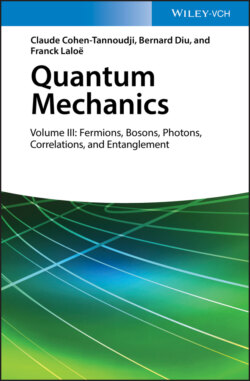Читать книгу Quantum Mechanics, Volume 3 - Claude Cohen-Tannoudji - Страница 166
β. Variation of the energies
ОглавлениеLet us now see what happens if the energy varies by . The function then varies by which, according to relation (40), induces a variation of :
(78)
and thus leads to variations of expressions (61) of and . Their sum is:
(79)
where the factor 1/2 in has been canceled since the variations induced by and double each other. Inserting (78) in this relation and using again (74), we get:
(80)
As for , its variation is the sum of a term in coming from the explicit presence of the energies in its definition (61), and a term in . If we let only the energy vary (not taking into account the variations of the distribution function), we get a zero result, since:
(81)
Consequently, we just have to vary by the distribution function, and we get:
(82)
Finally, after simplification by (which, by hypothesis, is different from zero), imposing the variation to be zero leads to the condition:
(83)
This expression does look like the stationarity condition at constant energy (77), but now the subscripts l and m are the same, and a term in is present in the operator.
